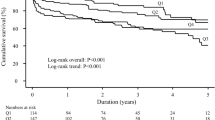Abstract
Background
Elevated C-reactive protein (CRP) is associated with adverse outcomes in heart failure (HF) patients. Beta-blocker therapy may lower CRP levels.
Methods and results
To assess if the changes of high-sensitivity (hs) CRP levels in HF patients over 12-week titration with beta-blockers correlate with functional capacity, plasma hs-CRP levels were measured in 488 HF patients [72.1 ± 5.31 years, LVEF 40% (33/50)]. Hs-CRP, NT-proBNP and 6-min-walk-test (6MWT) were assessed at baseline and at week 12. Patients were divided based on hs-CRP changes (cut-off > 0.3 mg/dl) into low–low (N = 225), high–high (N = 132), low–high (N = 54), high–low (N = 77) groups. At baseline, median hs-CRP concentration was 0.25 (0.12/0.53) mg/dl, NT-proBNP 551 (235/1455) pg/ml and average 6MWT distance 334 ± 105 m. NT-proBNP changes were significantly different between the four hs-CRP groups (P = 0.011). NT-proBNP increased in the low–high group by 30 (− 14/88) pg/ml and decreased in the high–low group by − 8 (− 42/32) pg/ml. 6MWT changes significantly differed between groups [P = 0.002; decrease in the low–high group (− 18 ± 90 m) and improvement in the low–low group (24 ± 62 m)].
Conclusion
After beta-blocker treatment, hs-CRP levels are associated with functional capacity in HF patients. Whether this represents a potential target for intervention needs further study.


Similar content being viewed by others
References
Koenig W (2013) High-sensitivity C-reactive protein and atherosclerotic disease: from improved risk prediction to risk-guided therapy. Int J Cardiol 168(6):5126–5134
van Empel V, Brunner-La Rocca HP (2015) Inflammation in HFpEF: key or circumstantial? Int J Cardiol 189:259–263
Huynh K, Van Tassell B, Chow SL (2015) Predicting therapeutic response in patients with heart failure: the story of C-reactive protein. Expert Rev Cardiovasc Ther 13(2):153–61
Ridker PM, Everett BM, Thuren T, CANTOS Trial Group et al (2017) Antiinflammatory therapy with canakinumab for atherosclerotic disease. N Engl J Med 377(12):1119–1131
Prasad K (2006) C-reactive protein lowering agents. Cardiovasc Drug Rev 24(1):33–50
Rostagno C, Gensini GF (2008) Six-minute walk test: a simple and useful test to evaluate functional capacity in patients with heart failure. Intern Emerg Med 3(3):205–12
Düngen HD, Apostolović S, Inkrot S, CIBIS-ELD Investigators, Subproject Multicenter Trials in the Competence Network Heart Failure et al (2008) Bisoprolol vs. carvedilol in elderly patients with heart failure: rationale and design of the CIBIS-ELD trial. Clin Res Cardiol 97(9):578–86
Silva D, Pais de Lacerda A (2012) High-sensitivity C-reactive protein as a biomarker of risk in coronary artery disease. Rev Port Cardiol 31(11):733–45
Pearson TA, Mensah GA, Alexander RW, Centers for Disease Control and Prevention; American Heart Association et al (2003) Markers of inflammation and cardiovascular disease: application to clinical and public health practice: a statement for healthcare professionals from the Centers for Disease Control and Prevention and the American Heart Association. Circulation 107(3):499–511
Van Linthout S, Tschöpe C (2017) Inflammation—cause or consequence of heart failure or both? Curr Heart Fail Rep. https://doi.org/10.1007/s11897-017-0337-9
Nessler J, Nessler B, Golebiowska-Wiatrak R et al (2013) Serum biomarkers and clinical outcomes in heart failure patients treated de novo with carvedilol. Cardiol J 20(2):144–51
Joynt KE, Gattis WA, Hasselbald V et al (2004) Effect of angiotensin-converting enzyme inhibitors, beta-blockers, statins, and aspirin on C-reactive protein levels in outpatients with heart failure. Am J Cardiol 93:783–785
Francis GS, Felker GM, Tang WH (2016) A test in context: critical evaluation of natriuretic peptide testing in heart failure. J Am Coll Cardiol 67(3):330–337
Dopheide JF, Geissler P, Rubrech J et al (2016) Influence of exercise training on proangiogenic TIE-2 monocytes and circulating angiogenic cells in patients with peripheral arterial disease. Clin Res Cardiol 105(8):666–76. https://doi.org/10.1007/s00392-016-0966-0
Dopheide JF, Scheer M, Doppler C et al (2015) Change of walking distance in intermittent claudication: impact on inflammation, oxidative stress and mononuclear cells: a pilot study. Clin Res Cardiol 104(9):751–63. https://doi.org/10.1007/s00392-015-0840-5
Kuo HK, Gore JM (2015) Relation of heart rate recovery after exercise to insulin resistance and chronic inflammation in otherwise healthy adolescents and adults: results from the National Health and Nutrition Examination Survey (NHANES) 1999–2004. Clin Res Cardiol 104(9):764–72 https://doi.org/10.1007/s00392-015-0843-2
Fernandes-Silva MM, Guimarães GV et al (2017) Inflammatory biomarkers and effect of exercise on functional capacity in patients with heart failure: insights from a randomized clinical trial. Eur J Prev Cardiol 24(8):808–817
Moreira DM1, Vieira JL, Gottschall CA (2009) The effects of METhotrexate therapy on the physical capacity of patients with ISchemic heart failure: a randomized double-blind, placebo-controlled trial (METIS trial). J Card Fail 15(10):828–34
Volaklis KA,Halle M, Koenig W et al (2015) Association between muscular strength and inflammatory markers among elderly persons with cardiac disease: results from the KORA-age study. Clin Res Cardiol 104(11):982–9. https://doi.org/10.1007/s00392-015-0867-7
Author information
Authors and Affiliations
Corresponding author
Ethics declarations
Conflict of interest
J. Butler: Consultant to Amgen, Astra Zeneca, Bayer, Boehringer Ingelheim, Janssen, Novartis, Relypsa, Trevena, ZS Pharma, Stealth Peptide, Medtronic, Merck, CVRx, Luitpold, and Vifor.
Rights and permissions
About this article
Cite this article
Radenovic, S., Loncar, G., Busjahn, A. et al. Systemic inflammation and functional capacity in elderly heart failure patients. Clin Res Cardiol 107, 362–367 (2018). https://doi.org/10.1007/s00392-017-1195-x
Received:
Accepted:
Published:
Issue Date:
DOI: https://doi.org/10.1007/s00392-017-1195-x




